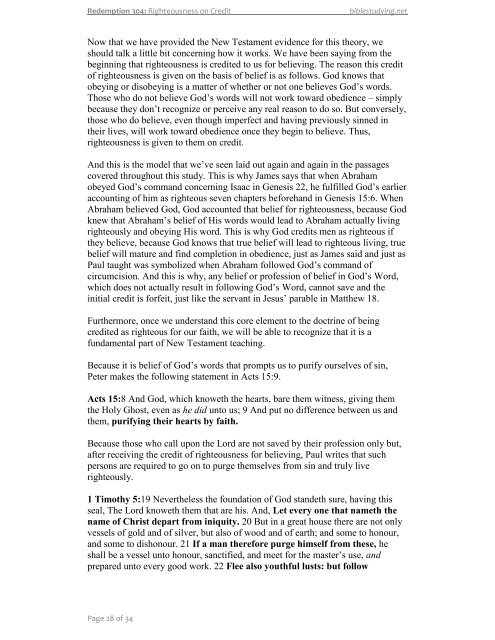righteousness-credit
righteousness-credit
righteousness-credit
Create successful ePaper yourself
Turn your PDF publications into a flip-book with our unique Google optimized e-Paper software.
Redemption 304: Righteousness on Credit<br />
biblestudying.net<br />
Now that we have provided the New Testament evidence for this theory, we<br />
should talk a little bit concerning how it works. We have been saying from the<br />
beginning that <strong>righteousness</strong> is <strong>credit</strong>ed to us for believing. The reason this <strong>credit</strong><br />
of <strong>righteousness</strong> is given on the basis of belief is as follows. God knows that<br />
obeying or disobeying is a matter of whether or not one believes God’s words.<br />
Those who do not believe God’s words will not work toward obedience – simply<br />
because they don’t recognize or perceive any real reason to do so. But conversely,<br />
those who do believe, even though imperfect and having previously sinned in<br />
their lives, will work toward obedience once they begin to believe. Thus,<br />
<strong>righteousness</strong> is given to them on <strong>credit</strong>.<br />
And this is the model that we’ve seen laid out again and again in the passages<br />
covered throughout this study. This is why James says that when Abraham<br />
obeyed God’s command concerning Isaac in Genesis 22, he fulfilled God’s earlier<br />
accounting of him as righteous seven chapters beforehand in Genesis 15:6. When<br />
Abraham believed God, God accounted that belief for <strong>righteousness</strong>, because God<br />
knew that Abraham’s belief of His words would lead to Abraham actually living<br />
righteously and obeying His word. This is why God <strong>credit</strong>s men as righteous if<br />
they believe, because God knows that true belief will lead to righteous living, true<br />
belief will mature and find completion in obedience, just as James said and just as<br />
Paul taught was symbolized when Abraham followed God’s command of<br />
circumcision. And this is why, any belief or profession of belief in God’s Word,<br />
which does not actually result in following God’s Word, cannot save and the<br />
initial <strong>credit</strong> is forfeit, just like the servant in Jesus’ parable in Matthew 18.<br />
Furthermore, once we understand this core element to the doctrine of being<br />
<strong>credit</strong>ed as righteous for our faith, we will be able to recognize that it is a<br />
fundamental part of New Testament teaching.<br />
Because it is belief of God’s words that prompts us to purify ourselves of sin,<br />
Peter makes the following statement in Acts 15:9.<br />
Acts 15:8 And God, which knoweth the hearts, bare them witness, giving them<br />
the Holy Ghost, even as he did unto us; 9 And put no difference between us and<br />
them, purifying their hearts by faith.<br />
Because those who call upon the Lord are not saved by their profession only but,<br />
after receiving the <strong>credit</strong> of <strong>righteousness</strong> for believing, Paul writes that such<br />
persons are required to go on to purge themselves from sin and truly live<br />
righteously.<br />
1 Timothy 5:19 Nevertheless the foundation of God standeth sure, having this<br />
seal, The Lord knoweth them that are his. And, Let every one that nameth the<br />
name of Christ depart from iniquity. 20 But in a great house there are not only<br />
vessels of gold and of silver, but also of wood and of earth; and some to honour,<br />
and some to dishonour. 21 If a man therefore purge himself from these, he<br />
shall be a vessel unto honour, sanctified, and meet for the master’s use, and<br />
prepared unto every good work. 22 Flee also youthful lusts: but follow<br />
Page 28 of 34


